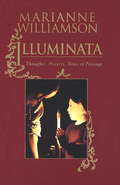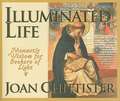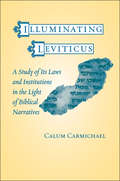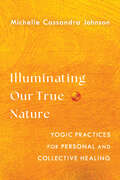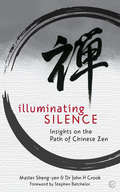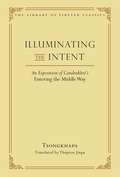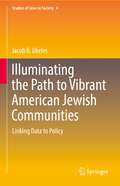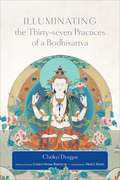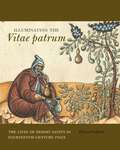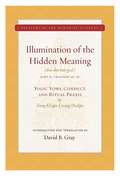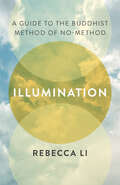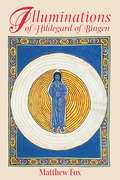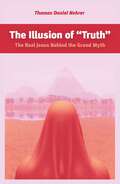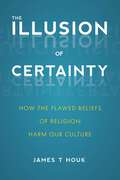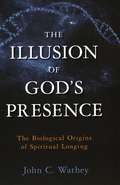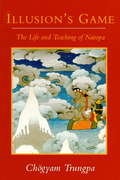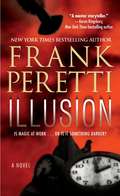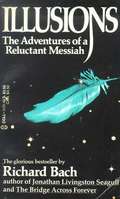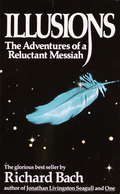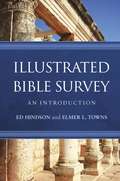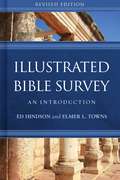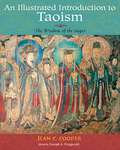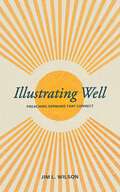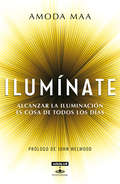- Table View
- List View
Illuminata: Thoughts, Prayers, Rites of Passage
by Marianne WilliamsonMarianne Williamson's bestselling A Return to Love ended with a prayer in which she asked God to help us "find our way home, from the pain to peace, from fear to love, from hell to Heaven." Now, in this stunning new collection of thoughts, prayers, and rites of passage, Marianne Williamson returns to prayer. Prayer is practical, Williamson tells us. "To look to God is to look to the realm of consciousness that can deliver us from the pain of living." Illuminata brings prayer into our daily lives, with prayers on topics from releasing anger to finding forgiveness, from finding great love to achieving intimacy. There are prayers for couples, for parents, and for children; prayers to mend broken relationships and prayers to overcome obsessive and compulsive love. There are prayers to heal the soul, prayers to heal the body, and prayers for work and creativity. Williamson also gives us prayers for the healing of America, including two prayers that have had powerful effects on audiences at her lectures: a prayer of amends on behalf of European Americans to African-Americans and one to Native Americans. How, Williamson asks, can we expect anyone to forgive when we have made no formal apology? Another section includes rites of passage, ceremonies of light for the signal events in our lives: blessing of the newborn, coming of age, marriage, and death. There is also a ceremony of the elder, for moving into midlife, and a ceremony of divorce, in which a gentle transition is provided for both the couple and their children. "Read my prayers or someone else's," Williamson says. "By all means, create your own." Illuminata is a way to bring prayer into practical use, creating a sweeter, more abundant life for yourself and the people you care for. "No conventional therapy," she says, "can release us from a deep and abiding psychic pain. Through prayer we find what we cannot find elsewhere: a peace that is not of this world."
Illuminated Life: Monastic Wisdom for Seekers of Light
by Joan ChittisterIn this little dictionary of monastic wisdom, Joan Chittister offers an A-Z of how to 'be in the world, but not of the world.' In her inimitable style, she eschews the quick fix in favor of a solid spiritual direction that has stood the test of time. Each chapter is devoted to a letter that illuminates a spiritual quality to be cultivated, from Awareness to Zeal, Community to Interiority, Enlightenment to Yearning--and many more. Every illumination opens with a story from the desert mystics, then segues into a practical application of that value to our tumultuous times.
Illuminating Leviticus: A Study of Its Laws and Institutions in the Light of Biblical Narratives
by Calum CarmichaelThe origin of law in the Hebrew Bible has long been the subject of scholarly debate. Until recently, the historico-critical methodologies of the academy have yielded unsatisfactory conclusions concerning the source of these laws which are woven through biblical narratives. In this original and provocative study, Calum Carmichael—a leading scholar of biblical law and rhetoric—suggests that Hebrew law was inspired by the study of the narratives in Genesis through 2 Kings.Discussing particular laws found in the book of Leviticus—addressing issues such as the Day of Atonement, consumption of meat that still has blood, the Jubilee year, sexual and bodily contamination, and the treatment of slaves—Carmichael links each to a narrative. He contends that biblical laws did not emerge from social imperatives in ancient Israel, but instead from the careful, retrospective study of the nation’s history and identity.
Illuminating Our True Nature: Yogic Practices for Personal and Collective Healing
by Michelle Cassandra JohnsonDissolve hurtful patterns and emotional hardship through the five yogic points of suffering, or kleshas.Includes powerful and practical meditations, mantras, asanas, reflection questions, and more, to reduce our suffering—and the suffering of others.We all get stuck in hurtful patterns that continue to create more suffering in our lives. In yoga philosophy, these patterns are known as the five kleshas. In this wise, practical guide, Michelle Cassandra Johnson offers us a path toward developing a deeper understanding of them and how they hijack us emotionally.The five kleshas are: ignorance (avidya); overidentification with ego (asmita); attachment to desire or pleasure (raga); aversion or avoidance (dvesha); and fear of death or letting go (abhinivesha). Each one leads us to create tendencies and karma that move us away from realizing and remembering our true nature and seeing ourselves as separate from one another and the planet. In yogic terms, this perpetuates a constant cycle of pain for us all.Readers will learn to: • deepen their connection with self and others; • look at their relationship and attachment to pleasure and aversion to discomfort; • notice more fully how their actions affect others; • meet each moment as it arises and ride the waves of life as they come; • and much moreJohnson offers us a way to find a sense of clarity, groundedness, and equanimity within ourselves by working through the kleshas one-by-one using asana, pranayama, mudra, mantra, reflection questions, and meditation.
Illuminating Silence: Insights on the Path of Chinese Zen Meditation
by Master Sheng-Yen John CrookAn insider's guide to the principles of Chan – or Chinese Zen – this book gives unfiltered access to the kind of illuminating experience with a Zen Master that is usually only available to a few fortunate practitioners.Having originated in China in the 6th century, Chan Buddhism is now growing rapidly in popularity, much of which can be attributed to its open, accepting attitude and its focus on a choice of meditative practices to best suit each individual. With the bulk of the text made up of edited transcripts of the teachings at two major retreats led in Wales in 1989 and 1995 by the then-head of the movement, Master Sheng Yen, this jewel of a book offers a rare glimpse inside both the ancient teachings and the contemporary practice of Chan. Words like 'enlightenment' rarely pass the lips of Master Sheng Yen. Instead, he makes it clear that his retreats are for the development of practice, to realize one is not in control of one's own mind, to discover how to train one's mind in awareness, to calm the mind, and to replace ignorance with insight. Commentary by Sheng Yen's much respected Western disciple John Crook gives full context to the teachings and provides a fascinating account of the practical aspects of a retreat of this nature, including the meditative practices of watching the breath, counting the breath and of 'Silent Illumination' that lies at the heart of Chinese Zen. In so doing the atmosphere of such a retreat is powerfully evoked, especially when Crook recounts the experiences and impacts of his own years of practice.
Illuminating the Intent: An Exposition of Candrakirti's Entering the Middle Way (Library of Tibetan Classics #19)
by Thupten JinpaThe Dalai Lama&’s translator and author of the definitive biography of Tsongkhapa here presents the first translation of one of that master&’s seminal and best-known works.This work is perhaps the most influential explanation of Candrakirti&’s seventh-century classic Entering the Middle Way (Madhyamakavatara). Written as a supplement to Nagarjuna&’s Fundamental Verses on the Middle Way, Candrakirti&’s text integrates the central insight of Nagarjuna&’s thought—the rejection of any metaphysical notion of intrinsic existence—with the well-known Mahayana framework of the ten levels of the bodhisattva, and it became the most studied presentation of Madhyamaka thought in Tibet. Completed the year before the author&’s death, Tsongkhapa&’s exposition of Candrakirti&’s text is recognized by the Tibetan tradition as the final standpoint of Tsongkhapa on many philosophical questions, particularly the clear distinctions it draws between the standpoints of the Madhyamaka and Cittamatra schools. Written in exemplary Tibetan, Tsongkhapa&’s work presents a wonderful marriage of rigorous Madhyamaka philosophical analysis with a detailed and subtle account of the progressively advancing mental states and spiritual maturity realized by sincere Madhyamaka practitioners. The work remains the principal textbook for the study of Indian Madhyamaka philosophy in many Tibetan monastic colleges, and it is a principal source for many Tibetan teachers seeking to convey the intricacies of Madhyamaka philosophy to non-Tibetan audiences. Though it is often cited and well known, this is the first full translation of this key work in a Western language.
Illuminating the Path to Vibrant American Jewish Communities: Linking Data to Policy (Studies of Jews in Society #4)
by Jacob B. UkelesThis book argues that the way to ensure that American Jewish life flourishes is to create vibrant local communities and that the ability to thrive will be won or lost in the trenches of each locality. For every generalization about the Jews of America, one can say, “maybe, but it depends where.” In the United States, Jewish life is up close and personal where local variations on national themes make a huge difference. The author presents case studies using in-depth analysis of data from nine Jewish community studies to illuminate eleven critical American Jewish policy issues. The analysis is used to formulate a range of policy options for different types of communities. This book is for anyone who cares about the future of American Jewry. It should be of particular interest to the lay leaders and professionals who play a role in Jewish nonprofits. It is also of great interest to researchers and students of Jewish studies and Jewish communal service.
Illuminating the Thirty-Seven Practices of a Bodhisattva
by Chokyi Nyima Rinpoche Chokyi Dragpa Heidi I. KopplA unique presentation of the Buddhist path by Chökyi Dragpa, the foremost Gelug disciple of the famed nineteenth-century Tibetan master Patrul Rinpoche.Illuminating the Thirty-Seven Practices of a Bodhisattva's quotations and direct instructions from realized sages of the past reinforce one another, subtly penetrating the mind and preparing it for meditation. This book, while fully accessible to newcomers, is especially powerful for serious, established practitioners. Illuminating the Thirty-Seven Practices of a Bodhisattva was previous published under the title Uniting Wisdom and Compassion.
Illuminating the Vitae patrum: The Lives of Desert Saints in Fourteenth-Century Italy
by Denva GallantDuring the fourteenth century in Western Europe, there was a growing interest in imitating the practices of a group of hermits known as the Desert Fathers and Mothers. Laypeople and religious alike learned about their rituals not only through readings from the Vitae patrum (Lives of the Desert Fathers) and sermons but also through the images that brought their stories to life.In this volume, Denva Gallant examines the Morgan Library’s richly illustrated manuscript of the Vitae patrum (MS M.626), whose extraordinary artworks witness the rise of the eremitic ideal and its impact on the visual culture of late medieval Italy. Drawing upon scholarship on the history of psychology, eastern monasticism, gender, and hagiography, Gallant deepens our understanding of the centrality of the Desert Fathers and Mothers to late medieval piety. She provides important insights into the role of images in making the practices of the desert saints both compelling and accessible to fourteenth-century city dwellers, who were just beginning to cultivate the habit of private devotion on a wide scale.By focusing on the most extensively illuminated manuscript of the Vitae patrum to emerge during the trecento, this book sheds new light on the ways in which images communicated and reinforced modes of piety. It will be of interest to art historians, religious historians, and students focusing on this period in Italian history.
Illumination of the Hidden Meaning Vol. 2: Yogic Vows, Conduct, and Ritual Praxis (Treasury of the Buddhist Sciences #2)
by Tsong Khapa DrakpaThis is the second volume of the annotated translation of Tsong Khapa’s Illumination of the Hidden Meaning (sbas don kun gsal), a magnificent commentary on the Cakrasamvara Tantra.This is the first English translation of this important work, which marked a milestone in the Tibetan understanding and practice of the Indian Buddhist tantras. It covers the vows, observances, and conduct of the initiated yogi, particularly in relation to the yoginis, whose favor he must cultivate. It describes in great detail the rites of the tradition, including homa fire sacrifice and the uses of the mantras of the mandala’s main deities. The author provides a trilingual English-Tibetan-Sanskrit glossary. Together with the present author’s related publications in this series—including a translation of the Cakrasamvara root tantra (2007) and critical editions of its Sanskrit and Tibetan texts (2012), and the first volume of this master Tibetan commentary (2017)—the reader will have the first full study of this important tantra available in English.
Illumination: A Guide to the Buddhist Method of No-Method
by Rebecca LiA modern guide to the transformative practice of silent illumination from Chan Buddhist teacher Rebecca Li.Silent illumination, a way of penetrating the mind through curious inquiry, is an especially potent, accessible, and portable meditation practice perfectly suited for a time when there is so much fear, upheaval, and sorrow in our world. It is a method of reconnecting with our true nature, which encompasses all that exists and where suffering cannot touch us.The practice of silent illumination is simple, allowing each moment to be experienced as it is in order to manifest our innate wisdom and natural capacity for compassion. It can be integrated into all aspects of daily life and is meaningful for secular and Buddhist audiences, new and seasoned meditators alike. After guiding readers through the history and practice of silent illumination, Rebecca Li shows us how we can recognize and unlearn our &“modes of operation&”—habits of mind that get in the way of being fully present and engaged with life. Cultivating clarity on the empty nature of these habits offers us a way to unlearn and free ourselves from unhelpful modes such as harshness to self, perfectionism, quietism, striving for spiritual attainment, and more.Illumination offers stories and real-life examples, references to classic Buddhist texts, and insights from Chan Master Sheng Yen to guide readers as they practice silent illumination not just on their cushions, but throughout their lives.
Illuminations of Hildegard of Bingen
by Matthew FoxAn introduction to the life and work of Hildegard. • Reveals the life and teachings of one of the greatest female artists and intellectuals of the Western Mystical Tradition. • Contains 24 full-color illustrations by Hildegard of Bingen. • Includes commentary by Matthew Fox, author of Original Blessing (250,000 sold). Hildegard of Bingen (1098-1179) was an extraordinary woman living in the Rhineland valley during most of the twelfth century. Besides being the abbess of a large and influential Benedictine abbey, she was a prominent preacher, healer, scientist, and artist. She also was a composer and theologian, writing nine books on theology, medicine, science, and physiology, as well as 70 poems and an opera. At the age of 42, she began to have visions; these were captured as 36 illuminations--24 of which are recorded in this book along with her commentaries on them. She also wrote a text describing these visions entitled Scivias (Know the Ways), now published as Hildegard of Bingen's Mystical Visions. Author Matthew Fox has stated, "If Hildegard had been a man, she would be well known as one of the greatest artists and intellectuals the world has ever seen." It is a credit to the power of the women's movement and our times that this towering genius of Western thought is being rediscovered in her full grandeur and autonomy. Virtually unknown for more than 800 years in Western history, Hildegard was featured as one of the women in Judy Chicago's Dinner Party in the early 1980s and published for the first time in English by Bear & Company in 1982. In addition to her mystical teachings, Hildegard's music has been performed and recorded for a new and growing audience.
Illusion of "Truth": The Real Jesus Behind the Grand Myth
by Thomas NehrerThe Illusion of "Truth" is a multifaceted look at Jesus of Nazareth, his message and religions created, not from his insights into reality, but on fantasy and lore concocted about him. Tom Nehrer builds on scholarly research through personal level of consciousness, exposing myths to find the real Yeshua who trod dusty roadways of first-century Judea. Understanding Jesus's Kingdom of Heaven within requires extensive perspective. This book explores: Historical, social, political and traditional settings for Jesus appearance; The mindset of ancients--how superstitious peasants imagined divine manipulation; Modern man's mindset -- how causality is projected not only onto gods, but onto real world forces, luck, chance and fate, all illusory processes; How life really works -- metaphysical connection of Self to Reality, an inner-outer flow; How beliefs create illusions -- masking Reality's flow with shared notions of "Truth" which isn't.; Many caveats to accepting Gospel accounts as reliable reports of any substance; The real life of Jesus -- how the man grew from first-century Jewish thinking to fully visionary status, aware of the Self as driving force in life; The Parables whose rich stories reveal Jesus' awareness of the functional Oneness of Consciousness/Reality; A deeply critical look at Christianity -- its early growth, smothering of alternate explanations and claims to represent true traditions back through the apostles to Jesus. That claim is shown as bogus, when Gospel writers only show apostles as unable to grasp Jesus' Kingdom illustrations. The Illusion of "Truth" reveals not only how life works and how Jesus was fully aware of its meaning-based flow -- but how Christianity grew from ancient notions and layered myth about Jesus, rather than insights from him.
Illusion of Certainty: How the Flawed Beliefs of Religion Harm Our Culture
by James T. HoukIn this examination of religion's influence on society, an anthropologist critiques fundamentalism and all mindsets based on rigid cultural certainties. The author argues that the future can only be safeguarded by a global humanistic outlook that recognizes and respects differing cultural perspectives and endorses the use of critical reason and empiricism. Houk coins the term "culturalism" to describe dogmatic viewpoints governed by culture-specific values and preconceived notions. Culturalism gives rise not only to fundamentalism in religion but also stereotypes about race, gender, and sexual orientation. Turning specifically to Christian fundamentalism, the author analyzes the many weaknesses of what he calls a faith-based epistemology, particularly as such thinking is displayed in young-earth creationism, the reliance on revelation and subjective experiences as a source of religious knowledge, and the reverence accorded the Bible despite its obvious flaws. As he points out, the problem with such cultural knowledge generally is that it is non-falsifiable and ultimately has no lasting value in contrast to the data-based and falsifiable knowledge produced by science, which continues to prove its worth as a reliable source of accurate information. Concluding that there is no future to the fundamentalist mindset in a diverse world where religion often exacerbates conflicts, he makes a strong case for reason and mutual tolerance.
Illusion of God's Presence: The Biological Origins of Spiritual Longing
by John C. WatheyAn essential feature of religious experience across many cultures is the intuitive feeling of God's presence. More than any rituals or doctrines, it is this experience that anchors religious faith, yet it has been largely ignored in the scientific literature on religion. Starting with a vivid narrative account of the life-threatening hike that triggered his own mystical experience, biologist John Wathey takes the reader on a scientific journey to find the sources of religious feeling and the illusion of God's presence. Hisbook delves into the biological origins of this compelling feeling, attributing it to innate neural circuitry that evolved to promote the mother-child bond. Dr. Wathey, a veteran neuroscientist, argues that evolution has programmed the infant brain to expect the presence of a loving being who responds to the child's needs. As the infant grows into adulthood, this innate feeling is eventually transferred to the realm of religion, where it is reactivated through the symbols, imagery, and rituals of worship. The author interprets our various conceptions of God in biological terms as illusory supernormal stimuli that fill an emotional and cognitive vacuum left over from infancy. These insights shed new light on some of the most vexing puzzles of religion, like the popular belief in a god who is judgmental and punishing, yet also unconditionally loving; the extraordinary tenacity of faith; the greater religiosity of women relative to men; religious obsessions with sex; the mysterious compulsion to pray; the seemingly irrepressible feminine attributes of God, even in traditionally patriarchal religions; and the strange allure of cults. Finally, Dr. Wathey considers the hypothesis that religion evolved to foster reproductive success, arguing that, in an age of potentially ruinous overpopulation, magical thinking has become a luxury we can no longer afford, one that distracts us from urgent threats to our planet. Deeply researched yet elegantly written in a jargon-free and accessible style, this book presents a compelling interpretation of the evolutionary origins of spirituality and religion.
Illusion's Game: The Life and Teaching of Naropa
by Chogyam TrungpaIn what he calls a "200 percent potent" teaching, Chögyam Trungpa reveals how the spiritual path is a raw and rugged "unlearning" process that draws us away from the comfort of conventional expectations and conceptual attitudes toward a naked encounter with reality. The tantric paradigm for this process is the story of the Indian master Naropa (1016-1100), who is among the enlightened teachers of the Kagyu lineage of the Tibetan Buddhism. Naropa was the leading scholar at Nalanda, the Buddhist monastic university, when he embarked upon the lonely and arduous path to enlightenment. After a series of daunting trials, he was prepared to receive the direct transmission of the awakened state of mind from his guru, Tilopa. Teachings that he received, including those known as the six doctrines of Naropa, have been passed down in the lineages of Tibetan Buddhism for a millennium. Trungpa's commentary shows the relevance of Naropa's extraordinary journey for today's practitioners who seek to follow the spiritual path. Naropa's story makes it possible to delineate in very concrete terms the various levels of spiritual development that lead to the student's readiness to meet the teacher's mind. Trungpa thus opens to Western students of Buddhism the path of devotion and surrender to the guru as the embodiment and representative of reality.
Illusion: A Novel
by Frank PerettiThe New York Times bestselling author of This Present Darkness and &“master storyteller&” (Karen Kingsbury, New York Times bestselling author) crafts a stunning thriller about a grieving husband who encounters a mysterious teen identical to his dead wife. Is this magic at work or something darker? After a car wreck tragically claims the life of his wife and magic partner, Mandy, Dane Collins finds himself in a quaint coffee shop transfixed by a magician whose illusions even he, a seasoned professional, cannot explain. Even more mysterious is the performer herself. Nineteen-year-old Mandy has never met him, doesn&’t know him, is certainly not in love with him, but is in every respect identical to the young beauty he met and married some forty years earlier. They begin a furtive relationship as mentor and protégée, but as Dane tries to figure out who Mandy really is, the two have no idea that she is being watched by those who not only possess all the answers but who also have the power to decide her fate.
Illusions of Love: A Novel
by Cynthia FreemanA long-denied love reignites after decades—and puts a marriage at risk—in this &“absorbing&” New York Times bestseller (People). Twenty-five years ago, Martin Roth made the most difficult decision of his life. He gave up the girl he loved, married a different woman, and raised a family. But he&’s just been given another shot at happiness. Sylvia has loved Martin since she was a young girl. They have two great children and a wonderful life together—until a love from Martin&’s past threatens everything she&’s worked so hard to build. Jenny McCoy can&’t believe she and Martin have found each other again—but she&’s never gotten over his cruel betrayal. Is she ready to forgive the sins of the past for a second chance? Moving between countries and across time, Illusions of Love tells the story of a man, his heritage, and the crisis of faith that brings his life to a crossroads.
Illusions: The Adventures of a Reluctant Messiah
by Richard BachWhat if a Siddartha or a Jesus came into our time, with power over the illusions of the world because he knew the reality behind them? And what if I could meet him in person, if he were flying a biplane and landed in the same meadow with me? What would he say, what would he be like?
Illusions: The Adventures of a Reluctant Messiah
by Richard BachIn the cloud-washed airspace between the cornfields of Illinois and blue infinity, a man puts his faith in the propeller of his biplane. For disillusioned writer and itinerant barnstormer Richard Bach, belief is as real as a full tank of gas and sparks firing in the cylinders...until he meets Donald Shimoda--former mechanic and self-described messiah who can make wrenches fly and Richard's imagination soar....In Illusions, the unforgettable follow-up to his phenomenal bestseller Jonathan Livingston Seagull, Richard Bach takes to the air to discover the ageless truths that give our souls wings: that people don't need airplanes to soar...that even the darkest clouds have meaning once we lift ourselves above them... and that messiahs can be found in the unlikeliest places--like hay fields, one-traffic-light midwestern towns, and most of all, deep within ourselves.
Illustrated Bible Survey: An Introduction
by Ed Hindson Elmer L. TownsIllustrated Bible Survey introduces all the books of the Bible from Genesis to Revelation. Based on more than thirty years of scholarly research and classroom teaching, editors Ed Hindson, Elmer Towns, and scholars from Liberty University provide a visually engaging, practical, readable, and insightful overview of God's Word and its eternal message. Ideally suited for undergraduate students, laymen, and pastors, this volume features: * Introductions to each book of the Bible, including background, date, author, outline, and message * Introductory chapters on the themes of the Bible, how we got our Bible, and the people and places of the Bible * Sidebars on the unique features, beneficial insights, and practical applications of biblical truths * Study questions and recommended further reading ECPA Gold Medallion award winners Hindson and Towns draw from a lifetime of teaching more than 100,000 students. They represent quality evangelical scholarship, along with a passion to make the Scriptures come to life as they open windows of insight into the biblical text. This exciting survey highlights the key elements of the literature, history, archaeology, and wisdom of the biblical text with an eye on the practical application of its timeless truths, moral principles, and theological insights so desperately needed in today's world.
Illustrated Bible Survey: An Introduction
by Ed Hindson Elmer L. TownsIllustrated Bible Survey introduces all the books of the Bible from Genesis to Revelation. Based on more than thirty years of scholarly research and classroom teaching, editors Ed Hindson, Elmer Towns, and scholars from Liberty University provide a visually engaging, practical, readable, and insightful overview of God's Word and its eternal message. Ideally suited for undergraduate students, laymen, and pastors, this volume features: * More than 200 full-color photographs, maps, charts, and illustrations * Introductions to each book of the Bible, including background, date, author, outline, and message * Introductory chapters on the themes of the Bible, how we got our Bible, and the people and places of the Bible * Sidebars on the unique features, beneficial insights, and practical applications of biblical truths * Study questions and recommended further reading ECPA Gold Medallion award winners Hindson and Towns draw from a lifetime of teaching more than 100,000 students. They represent quality evangelical scholarship, along with a passion to make the Scriptures come to life as they open windows of insight into the biblical text. This exciting survey highlights the key elements of the literature, history, archaeology, and wisdom of the biblical text with an eye on the practical application of its timeless truths, moral principles, and theological insights so desperately needed in today's world.
Illustrated Introduction To Taosim: The Wisdom of the Sages
by Jean C. CooperContaining 118 stunning color illustrations, this beautiful book provides an introduction to Taoism, one of the great religious and philosophical movements in Chinese thought. Incorporating selections from J.C. Cooper's writings, it explores the concept of the Tao (Way), the symbolism of Yin-Yang, and the thought of the leading Taoist sages. Also included are sections on Taoist art, the symbolism of plants and animals, the Taoist garden, and the relationship of Taoism with Buddhism and Hinduism.
Illustrating Well: Preaching Sermons that Connect
by Jim L. WilsonCommunicate well by illustrating well Preachers face all kinds of obstacles on Sunday mornings. A sermon that employs interesting and appropriate illustrations can help break through barriers and convey truth in a fresh way. In Illustrating Well, Jim L. Wilson provides pastors with the tools to effectively use sermon illustrations to help them communicate the Bible's teachings. To reach the hearts and minds of their congregations, preachers must do more than explain the truth; they must demonstrate how the truth relates to real life. Every sermon should be theologically rich and thoroughly biblical, but a good illustration can take what might be an abstract concept and turn it into a concrete reality for the listener. In Illustrating Well, preachers will discover what makes for a compelling illustration as well as the benefits and potential pitfalls of particular types of illustrations.
Ilumínate: Alcanzar la iluminación es cosa de todos los días
by Amoda MaaLa iluminación no es algo exclusivo de los sabios, los monjes o las personas que meditan. La iluminación se puede experimentar en la vida diaria y este libro te explica cómo. Amoda Maa elimina algunos de los mitos más comunes sobre la iluminación y ofrece una explicación accesible de los alcances de la conciencia despierta para cualquier persona que desee encontrar paz y plenitud en medio de este mundo caótico. Con claridad, pasión y gracia, Ilumínate ofrece orientación sobre cómo tu vida diaria puede llevarte al despertar y a la trascendencia. Este libro te ayudará a balancear la espiritualidad con temas recurrentes de la vida cotidiana como la abundancia, las relaciones personales, el bienestar físico, el trabajo, el dinero y la creatividad para alcanzar la felicidad y la plenitud en tu vida. Prólogo de John Welwood
